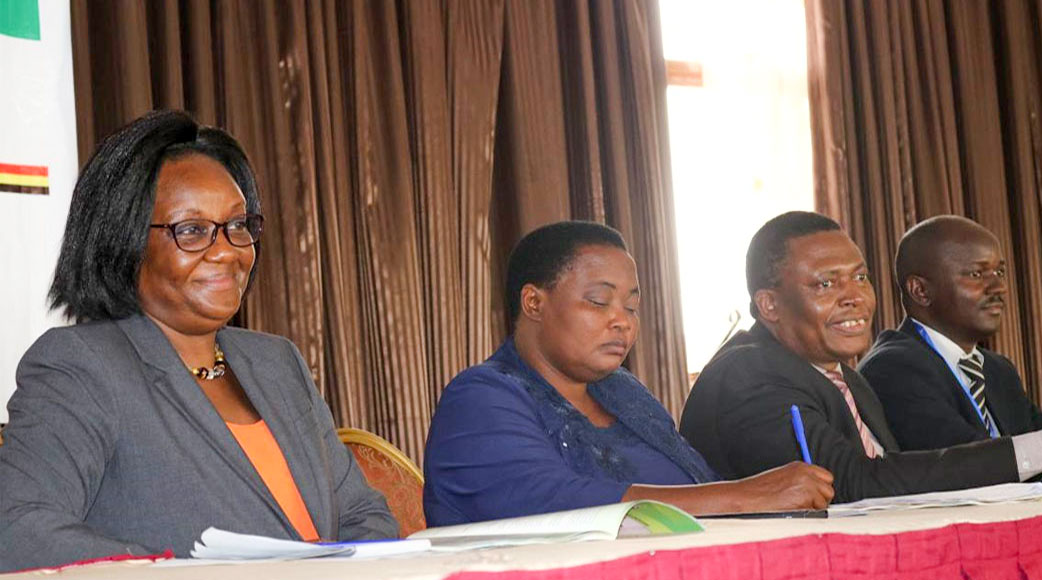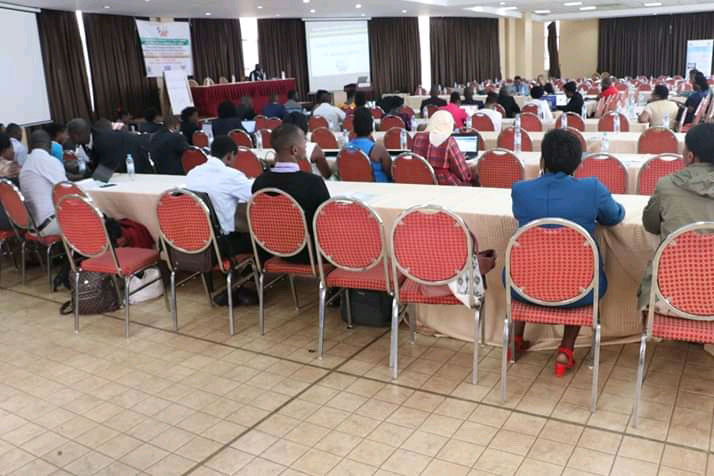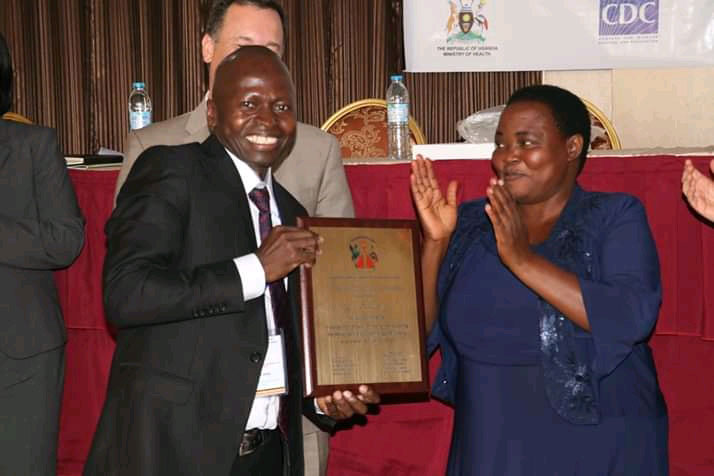
The Dean, Makerere University School of Public Health-Prof. Rhodah Wanyenze (1st left), State Minister for Health and General Duties. Hon Robinah Nabbanja (2rd left) with other key dignitaries at the Event.
Written by Joseph Odoi
As the international community responds to an outbreak of coronavirus-induced pneumonia in Wuhan, China, Dr. Ben Masiira has revealed that Africa needs a total of 4000 epidemiologists if it’s to meet mushrooming Public Health demands across the Continent.
He made the remarks at the 4th graduation of 10 fellows of the Public Health Fellowship Program (PHFP) at Imperial Royale Hotel, Kampala Uganda on 31st January,2020 while representing the Director- African Field Epidemiology Network (AFENET)
He also noted that Africa currently boasts of only 3000 epidemiologists which is not at par with global standards.
According to CDC (Centre for Disease Control and Prevention), epidemiologists are health professionals (disease detectives) who search for the cause of disease, identify people who are at risk, determine how to control or stop the spread or prevent it from happening again.
To address capacity plights, Dr.Masiira stressed the importance of partnership in building a concrete public health workforce equipped with practical skills to respond to surveillance and outbreak investigations.
With support from CDC , he noted that AFENET has produced over 3000 graduates who are serving community through surveillance and response to public health concerns.
In her opening remarks, the Dean of the School of Public Health, Makerere University – Prof. Rhoda Wanyenze in a special way congratulated the fellows upon completion of a challenging but fruitful two-year program.
On gains, Prof Wanyenze revealed that the program has enrolled over 50 fellows so far with participation in more than 100 investigations in 5 years that will help map new areas in research like non-communicable diseases.
She added that the graduates responded to over 40 outbreaks since joining the program in 2018.
As part of improving the program, Prof .Wanyenze also revealed the PHFP team is working on a 10 year strategic plan to enhance quality of public health fellows.
Moving forward, Prof Wanyenze encouraged the fellows to never stop learning in an ever complacent world.
“Be a group of people who will generate solutions to address public health challenges” she advised the students
The Director general at the Ministry of health, Dr Charles Olaro in a speech emphasized the importance of partnership in promoting health citing the WHO, Makerere University School of public health and American effort towards the PHFS fellowship which in turn trains the quality public health leaders to improve health in Uganda.
Representing the World Health Organization (WHO) was Dr. Bayo Fatunmbi who congratulated the fellows upon completion and thanked partners and family of the fellows for the support to the fellowship program.
Moving forward, he advised the fellows to use knowledge gained from their fellowship to respond to public health emergencies adding that WHO is always ready to offer technical assistance to public health programs.
Also at the event, Deputy Chief of Mission for US Embassy Christopher Kraft advised the fellows to work hard in ensuring that Ugandans are safe since health is a foundation for development.
Mr Kraft also observed that a lot needs to be done to address staff shortages which pose a great challenge to health emergency response.
Kraft further reminded the participants of America’s commitment towards supporting capacity building in Uganda and Africa by far.
In her closing remarks, the State Minister for Health and General Duties, Robinah Nabbanja who was the Chief Guest at the graduation congratulated the fellows reckoning that new public health challenges like coronavirus (now a public health emergency) calls for new minds like that of the graduate fellows with adequate skills to tackle it.
Hon. Nabbanja also thanked the leadership of PHFP, partners like AFENET, CDC, WHO and Ministry of Health and MakSPH for making the program successful.
To crown off the day, Ms. Nabbanja led a team of key dignitaries and partners including the US CDC, WHO, and AFENET in handing certificates to graduates Dr Fred Monje was recognized as the Best Performer in the Fellowship.
More about the Public Health Fellowship.
The Public Health Fellowship Program (PHFP) is a partnership between the Ministry of Health (MoH), U.S. Centers for Disease Control and Prevention (CDC), AFENET and MakSPH aimed at developing the next generation of public health leadership for Uganda.
The goal of the program is to develop a competent workforce by learning-through-service and responding to real public health problems of Uganda
The PHFP is also a two-year training-in-service program aimed at equipping public health professionals with the skills they need to manage public health challenges.
The program is offered in five tracks (Field Epidemiology, Monitoring and Evaluation, Laboratory Systems, Health Informatics and Health Economics). The program began with the Field Epidemiology Track – FET Track in January 2015 and currently, has two cohorts. These Fellows have been introduced to the basic tenets of Field Epidemiology and are placed at their respective host sites within the Ministry of Health and the district health departments. The program keeps evolving to meet arising public health challenges.



